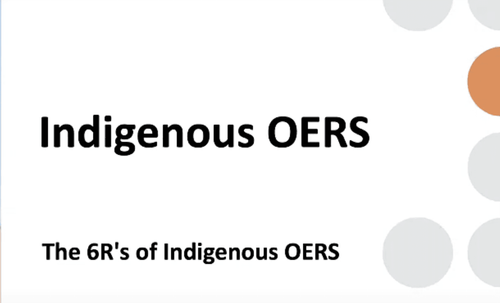About This Material
Summary
This video was created for the Program of Open Scholarship and Education at UBC. The recording is an open chat with Kayla Lar-Son, who discussed some concerns around OER and Indigenous knowledges while exploring tools, principles, and practices for engaging with Indigenous communities.
Competency
This webinar supports ethical and legal considerations with a discussion of the tension between Canadian copyright law and Indigenous knowledges. It calls for reconsideration of Indigenous knowledges and self-determination in the open education community. It also supports digital scholarship, community-based learning, and creation and curation as it presents guidelines for how to honour Indigenous ways of knowing and sovereignty when engaging with OER.
- Ethical & legal considerations
- Digital scholarship
- Communication & collaboration
- Creation & curation
- Community-based learning
How to Use
Watching the webinar allows opportunities for learning, discussion, and reflection.
Audience
An instructor, staff member, or student who is interested in learning more about the 6Rs of Indigenous OER will find this resource helpful. The focus is perhaps more geared toward educators or staff members who create OER or engaging with OER.
Outcome
Learners will have an understanding of the 6 Rs of Indigenous OER and how to create and engage with OERs.
Digital Literacy
This resource supports the development of skills and competencies in the B.C. Post-Secondary Digital Literacy Framework and aligns with the following competencies.
Using This Material
This resource is licensed under a Creative Commons Attribution 4.0 International License.
You may:
As long as you follow these terms:
Other things to know:
- The licensor cannot revoke these freedoms as long as you follow the license terms.
- You do not have to comply with the license for elements of the material in the public domain or where your use is permitted by an applicable exception or limitation.
- No warranties are given. The license may not give you all of the permissions necessary for your intended use. For example, other rights such as publicity, privacy, or moral rights may limit how you use the material.
